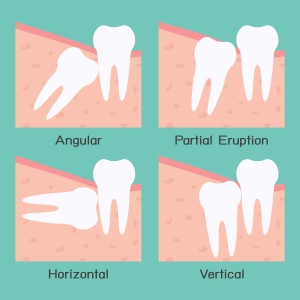Wisdom Teeth Removal: Stop Health Problems Before They Start

The wisdom teeth in modern-day humans are highly likely to become impacted, and when they do, it can have serious consequences for a patient’s oral health and overall well-being.
To avoid such outcomes, many patients will opt to have an oral surgeon remove their impacted wisdom teeth before any symptoms even develop. In fact, for many patients, wisdom tooth extraction is the first experience with dental surgery.
Why Wisdom Teeth Become Impacted
The wisdom teeth, also known as the third molars, are the largest teeth in the mouth. They originally served important functions for our ancient human ancestors, helping to process a tough, fibrous diet and replacing teeth lost due to wear and tear.
However, those early humans also had jaws that were large enough to allow the wisdom teeth to erupt properly. That is no longer the case. The jaws in modern-day humans are much smaller, and often the wisdom teeth aren’t able to push through the gum and bone to enter the smile. They become impacted.
Risks Associated With Impacted Wisdom Teeth
Impacted wisdom teeth aren’t merely an annoyance. They can create significant risks to a patient’s oral health, including:
- Infections
- Abscesses
- Cysts
- Tumors
Furthermore, the impacted wisdom teeth will continue to try to erupt, which can cause discomfort and damage to other teeth in the vicinity. Those teeth may also shift out of position to try to accommodate the wisdom teeth.
Patients who want to avoid these issues will consider having their impacted wisdom teeth extracted. It’s preferable to have this procedure before age 25, as it is simpler and is associated with a shorter recovery period in younger patients.
Wisdom Tooth Removal: What to Expect
Impacted wisdom teeth must be extracted surgically because the oral surgeon will first need to remove the surrounding bone to be able to access and remove the wisdom teeth. Patients often opt for some form of sedation to accompany this procedure.
Patients who choose sedation need to make arrangements to have a responsible adult escort them home after the appointment. It’s also important to follow your surgeon’s post-operative instructions to reduce your risk of complications that can derail the healing process.
If you want to protect your oral health from complications associated with impacted wisdom teeth, contact Stonebriar Facial & Oral Surgery for an evaluation to see if you are a candidate for a wisdom tooth removal.
